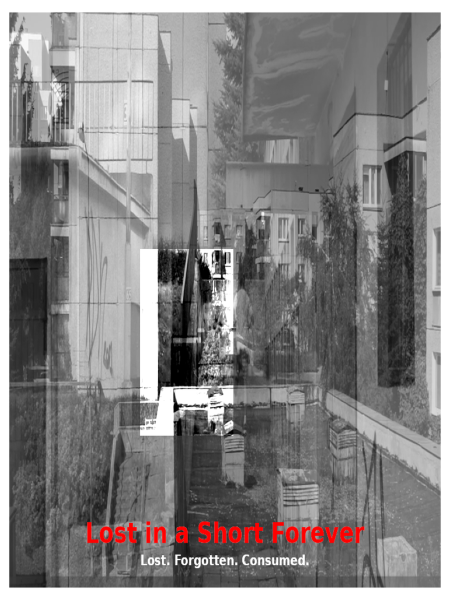
CONTENTS Lost in a Short Forever (short film) Victoria Piasecka et al. The Lighthouse (parody trailer) Carson Creasy Ohio (short film) Kai Drees Making Marion (podcast segment) Dallas White |


Victoria Piasecki (producer), Alan Piasecki (writer, director, editor), Mateus Markowski (Nomad), and Ryszard Żyl̷a (cinematographer), Lost in a Short Forever
DESCRIPTION:
Lost in a Short Forever explores time and perception in a surreal, claustrophobic world, focusing on psychological tension and suspense. In this short film, the charqcter Nomad drifts through an empty world that won’t let him go. Time folds onto itself, looping endlessly. Silence chokes him, shadows stretch. He runs, but there’s no escape. Walls close in. The sky caves. Lost. Forgotten. Consumed.
ALAN PIASECKA | (Director, Writer, & Editor, Lost in a Short Forever) The origin of Lost in a Short Forever came from the saying ‘water under the bridge.’ I’ve always been fascinated by how time changes things, creating uncertainty and paranoia—even the most familiar places can become unnerving. This idea stemmed from my own experiences with anxiety, even in moments of calm.
When crafting the film, I started by listening to the music score, letting it guide the visuals. Location scouting in Poland, my homeland, took time, but I knew I needed a setting that felt timeless. That’s when I settled on 1960s architecture, which fit the film’s atmosphere perfectly. My friend and lead actor, Mateusz, drove me to the location, and despite technical limitations, I found ways to work with what I had—including using a bike as a dolly, tying the camera to it with a rope to track the running scenes. Time and patience were essential in bringing this vision to life.
As an editor, I focused on pacing to reflect the character’s unraveling state. The first third of the film needed space to breathe, so the editing was controlled and deliberate. As the turning point neared, I gradually made the cuts more erratic to heighten the frenzy and uncertainty. One of my favorite parts of the process was improvising scenes that weren’t in the script—it added a unique spontaneity to the film.
Filmmaking is a balance between structure and discovery, and Lost in a Short Forever embodies that perfectly. I’m grateful for the incredible team that brought this vision to life, and I hope it leaves viewers feeling the same sense of eerie uncertainty we aimed to capture.
MATEUS MARKOWSKI | (Actor - "Nomad") The director gave me a simple yet intense directive—start the film as if it were just another mundane day, then let it unravel into what might be my last. I had to move as if something—someone? —was chasing me, ready to end me. The challenge was to maintain a stoic face, with all the fear, anxiety, and uncertainty conveyed only through my eyes. It’s amazing how much more the eyes can express than facial expressions alone. Running became my full-time job on this shoot. Alan had water on standby for every take, but the real reward? At the end of each day, for my dedication to sprinting endlessly, the director thanked me the best way possible—with a case of Polish beer.
The funniest moment? On the last day of shooting, I shaved. A terrible mistake. Since continuity would be completely ruined, I had to wait until my stubble grew back before we could continue. Lesson learned—never underestimate the power of facial hair in filmmaking!
RYSZARD ŻYL̷A | (Cinematographer) As a nature photographer, I approached this film the way I would a forest—observing movement, light, and texture—rather than treating it as part of an industrial landscape. The goal was to make this small Polish town feel like it could be any sprawling metropolis, a place on the verge of collapse, like Manhattan folding in on itself. I used extreme close-ups and tracking shots to entangle the viewer with the subject, immersing them in a sense of dread and paranoia.
Then came the running scene. The director had an interesting idea—tie the camera to his bicycle with a rope and chase the actor like some kind of avant-garde Tour de France. I stood back and admired the madness. It worked, though. Who needs expensive rigs when you’ve got ingenuity and a sturdy bike?
VICTORIA PIASECKA | (Producer) I believe in Alan—director, writer, editor, and all-around mad genius. When he first brought this film idea to me, after seeing the script, location scouting pictures, and his vivid descriptions, I knew I had to be part of it. Working with Alan, Mateusz, and Ryszard was an instant "yes." My passion for filmmaking and production fueled my determination to help Alan achieve his Magnum Opus.
Lost in a Short Forever is a film that transcends place and time, capturing the universal feeling of being lost and alone. I jumped into the production with open arms—and a full budget breakdown. With the crew’s blessing, I added an aesthetic touch to the film and an eerie opening shot: a flickering static-filled TV and an unanswered ringing phone, setting the tone for the film’s overwhelming uncertainty. Production costs? A modest $11,000, covering essentials like plane tickets to Poland, gas, lodging, rope (for the infamous bike dolly), camera equipment, and, of course, crucial payments—Polish beer and food. Alan and I have more projects ahead, and he’s already deep into writing a dynamic new screenplay. I’m honored to be producing his upcoming work and can’t wait for what’s next. Thank you all for watching Lost in a Short Forever—now excuse me while I calculate how much Polish beer money should be allocated in the next budget.
